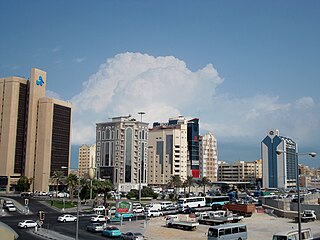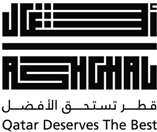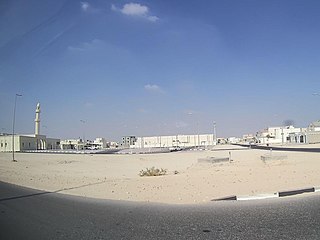
Al Wakrah is the capital city of the Al Wakrah Municipality in Qatar. Al Wakrah's eastern edge is the shores of the Persian Gulf and Qatar's capital Doha is situated to the city's immediate north. Governed by Sheikh Abdulrahman bin Jassim Al Thani, it was originally a small fishing and pearling village. Over the years, it evolved into a small city with a population of more than 80,000 and is currently considered to be the second-largest city in Qatar.

Lusail is the second-largest city in Qatar, located on the coast, in the southern part of the municipality of Al Daayen. Lusail is located about 23 kilometres (14 mi) north of the city centre of Doha, just north of the West Bay Lagoon, on over 38 square kilometres (15 sq mi) and will eventually have the infrastructure to accommodate 450,000 people. Of these 450,000 people, it is estimated that 250,000 or fewer will be residents, 190,000 will be office workers and 60,000 will be retail workers.

Qatar, officially the State of Qatar, is a country in Western Asia. It occupies the Qatar Peninsula on the northeastern coast of the Arabian Peninsula in the Middle East; it shares its sole land border with Saudi Arabia to the south, with the rest of its territory surrounded by the Persian Gulf. The Gulf of Bahrain, an inlet of the Persian Gulf, separates Qatar from nearby Bahrain. The capital is Doha, home to over 80% of the country's inhabitants, and the land area is mostly made up of flat, low-lying desert.

Mushayrib is a district in Qatar, located in the municipality of Ad Dawhah. As of the 2010 census, the former district of Al Asmakh has been integrated into Mushayrib. It is one of the oldest districts of Doha, and contains Al Kahraba Street, the country's first fully lit street.

Al Khor, officially Al Khor and Al Thakhira, is a municipality in coastal northeastern Qatar. Al Khor City, the municipal seat, is located in the northeast coast of Qatar, around 50 kilometres from the capital, Doha and it is considered to be one of the major cities in Qatar. Al Thakhira is the second largest settlement in the municipality after Al Khor City.
The state of human rights in Qatar is a concern for several non-governmental organisations, such as Human Rights Watch, which reported in 2012 that hundreds of thousands of mostly South Asian migrant workers in construction in Qatar risk serious exploitation and abuse, sometimes amounting to forced labour. Awareness grew internationally after Qatar's selection to stage the 2022 FIFA World Cup, and some reforms have since taken place, including two sweeping changes in 2020.

Sport in Qatar is primarily centred on football in terms of participation and spectators. Additionally, athletics, basketball, handball, volleyball, camel racing, horse racing, cricket and swimming are also widely practised. There are currently eleven multi-sports clubs in the country, and seven single-sports clubs.

Al Waab is a district situated between the municipalities of Doha and Al Rayyan in Qatar. The district has witnessed tremendous growth beginning in the mid-1990s, resulting in the construction of numerous residential compounds to house expatriates, villas, and commercial and medical developments. It is a district of Al Rayyan City, which, in turn, is a part of Metropolitan Doha.

Doha is the capital city and main financial hub of Qatar. Located on the Persian Gulf coast in the east of the country, north of Al Wakrah and south of Al Khur, it is home to most of the country's population. It is also Qatar's fastest growing city, with over 80% of the nation's population living in Doha or its surrounding suburbs.

Education City Stadium is a football stadium which is located in Al Rayyan, Qatar, and was built as a venue in time for the 2022 FIFA World Cup held in Qatar. The stadium is located within several university campuses at the Qatar Foundation's Education City. Following the FIFA World Cup, the stadium will retain 25,000 seats for use by university athletic teams. On 3 September 2020, the stadium hosted its first official match, played in the 2020–21 Qatar Stars League season.
Nepalis in Qatar are migrants from Nepal to Qatar, mostly migrant workers and permanent residents, as well as their locally born descendants. As of May 2017, 400 thousand Nepali Citizens lived in Qatar as migrant workers, Nepal is the second largest expatriate community in Qatar. While there are Nepalese working in the business and administrative sectors of Qatar, most workers from Nepal fall under the umbrella of unskilled labor, and hold jobs in sectors such as construction and landscaping. Many workers from Nepal are hired to work on the construction of stadiums and railways that are being designed for the 2022 FIFA World Cup to be held in Qatar. According to Time Magazine, due to the terrible working conditions in Qatar, a Nepali worker dies every other day.

The kafala system is a system used to monitor migrant laborers, working primarily in the construction and domestic sectors in Gulf Cooperation Council member states and a few neighboring countries, namely Qatar, Bahrain, Kuwait, Lebanon, Oman, Saudi Arabia and the United Arab Emirates.

Ashghal is the Public Works Authority of Qatar headquartered in Al Dafna, Doha. Ashghal was established based on the Emiri Decree issued by the Father Emir Sheikh Hamad bin Khalifa Al Thani on 20 January 2004, as an autonomous body to design, deliver and manage all infrastructure related projects as well as public amenities of the State. Ashghal is responsible for the construction and maintenance of local roads, drainage systems, highways and public buildings like mosques, schools, hospital, health centers, parks, etc.
Mesaimeer is a district in the municipality of Al Rayyan in Qatar. Located south-west of Doha, it shares borders with the Doha Industrial Area to the east, Umm Al Seneem, Abu Hamour and Al Mamoura to the north-west, Al Thumama to the east, and Wadi Aba Saleel and Jery Musabbeh to the south-east.

Msheireb Downtown Doha is a planned city in Doha, Qatar being constructed in place of the current district of Mushayrib. Initial construction began in January 2010. Located in the downtown area of Qatar's capital city, it is set to occupy 310,000 sq m with the total cost of construction amounting to approximately $5.5 billion. It was launched in six phases by Msheireb Properties, a subsidiary of Qatar Foundation.

Rawdat Al Hamam is a village in the municipality of Al Daayen in Qatar. It is located between two major highways: Al Khor Expressway and Al Shamal Road. Government authorities have launched major developments in the village, including a housing subdivision with a target capacity of 30,000 residents.
Migrant workers in the Gulf Cooperation Council region involves the prevalence of migrant workers in the Kingdom of Bahrain, the State of Kuwait, the Sultanate of Oman, the State of Qatar, the Kingdom of Saudi Arabia and the United Arab Emirates (UAE). Together, these six countries form the Gulf Cooperation Council (GCC), established in 1981. The GCC cooperates on issues related to economy and politics, and the subject of migrant workers constitutes a substantial part of the council's collaboration. All of the GCC countries are dependent on migrant labor to bolster and stimulate economic growth and development, as the GCC countries possess an abundance of capital while the domestic labor capacity is low. Although migrant workers in the Persian Gulf region amount to no more than 10% of all migrants worldwide, they constitute a significant part of the populations of their host countries.

Al-Janoub Stadium, formerly known as Al-Wakrah Stadium, is a retractable roof football stadium in Al-Wakrah, Qatar that was inaugurated on 16 May 2019. This was the second among the eight stadiums for the 2022 FIFA World Cup in Qatar, after the renovation of Khalifa International Stadium. It was designed by Iraqi-British architect Zaha Hadid (1950–2016) together with the firms AECOM and Jain and Partners of Dubai.

The treatment of South Asian labourers in the Gulf Cooperation Council (GCC) region is an ongoing issue between members of the South Asian Association for Regional Cooperation (SAARC) nations and the wealthy oil-rich Gulf Cooperation Council. The current large number of migrants from South Asia to the Persian Gulf began in the 1960s, when the oil boom in the Gulf Arab countries resulted in migrant labourers. This further increased with the development of large mega-cities. With the growth of megacities of Dubai, Doha and Riyadh, the need for construction labourers grew. Migrants from Pakistan, India and Bangladesh were contracted to develop the mushrooming skyscrapers. Many of these migrants were brought into the GCC under the kafala system, a sponsor-based system used in the GCC, which is seen by many human rights groups as highly exploitative, since their passports are confiscated and are forced to work in low-level conditions, with cramped living quarters, low salary, and sometimes even without their due pay; when exploitation is brought up or exposed by media or the labourers, their employers are rarely punished.
There have been several criticisms and controversies of perceived human rights violations related to the organisation and hosting of the 2022 FIFA World Cup in Qatar. There have long been concerns for the state of human rights in Qatar, with the state accused of sportswashing in hosting the World Cup.














